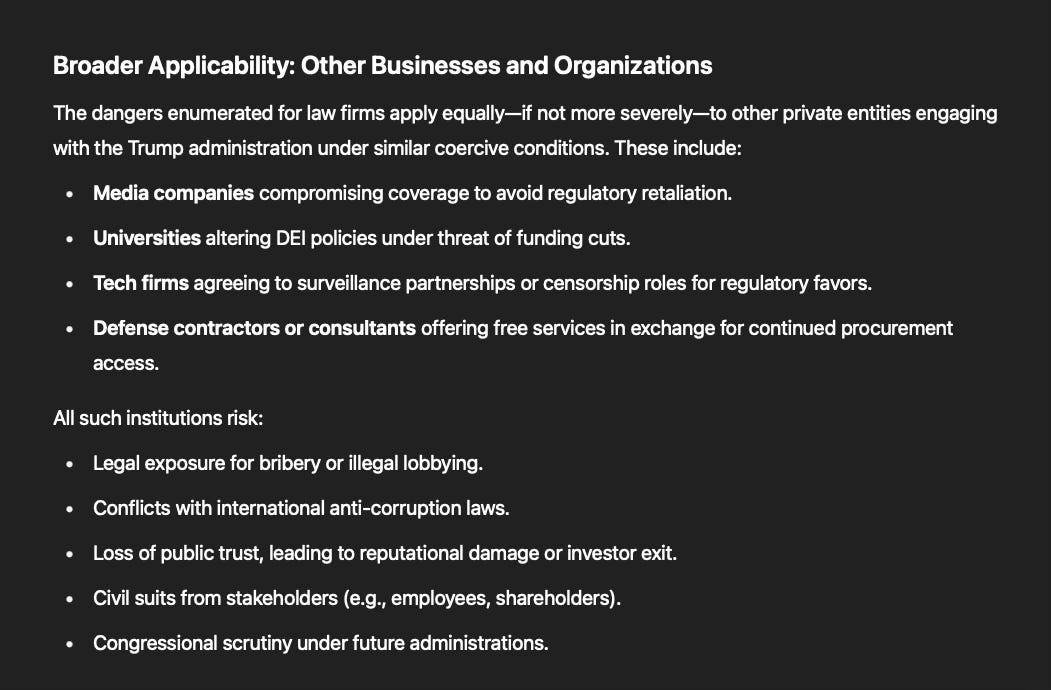- Pascal's Chatbot Q&As
- Posts
- The implications of prominent law firms reaching settlements with the Trump administration after being targeted by executive orders. They are walking into a legal and ethical minefield.
The implications of prominent law firms reaching settlements with the Trump administration after being targeted by executive orders. They are walking into a legal and ethical minefield.
A stark warning to American and international legal institutions about the complex legal, ethical, and reputational dangers of capitulating to coercive executive power.
@cohen.489 clearly these partners are not on TikTok bc they have not learned the most important lesson of all: if you let the commenters know your fe... See more
Essay: The Perils of Collaboration – An Analysis of Law Firms’ Deals with the Trump Administration
by ChatGPT-4o
In their article “The Law Firms’ Deals with Trump Are Even Riskier Than They Seem”, Natalie K. Orpett and James Pearce present a stark warning to American and international legal institutions about the complex legal, ethical, and reputational dangers of capitulating to coercive executive power. Specifically, the piece dissects the implications of prominent law firms reaching settlements with the Trump administration after being targeted by executive orders. These settlements—often ambiguous and undocumented—raise profound concerns not just for the legal profession but for any private institution contemplating collaboration with a politically vindictive regime.
Summary of Risks and Potential Consequences
The article outlines a comprehensive array of immediate and long-term risks arising from these deals:
1. Criminal Liability
U.S. Federal Law: The firms may have violated bribery statutes (18 U.S.C. § 201) by providing pro bono services to the Trump administration in exchange for favorable treatment (e.g., rescinding or withholding executive orders). This constitutes a textbook quid pro quo arrangement.
Extortion via the Hobbs Act (18 U.S.C. § 1951): The administration’s coercion could amount to “extortion under color of official right,” with law firms arguably complicit.
Racketeering (RICO) and Money Laundering: These bribery/extortion activities could expose firms to further liability under racketeering or money laundering statutes, with long-term prosecution windows (e.g., 5-year statute of limitations restarting with each pro bono service).
2. International Legal Exposure
UK Bribery Act (2010): Nearly all the firms maintain London offices, making them vulnerable to UK anti-bribery laws due to the cross-border nature of their dealings. The law’s extraterritorial reach and broad definitions around "services of value" increase exposure, including corporate liability if even one senior manager violates the Act.
3. Ethical Violations and Bar Discipline
Conflicts of Interest: Lawyers must avoid representing clients when their interests are compromised by personal or third-party interests. The Trump deals create an inherent conflict between firms’ business survival and their duty to existing clients.
Loss of Independence: The settlements risk transforming law firms into quasi-government contractors, undermining the foundational principle that lawyers should not be beholden to any authority but the law.
Possible Disbarment: Violations of these ethical rules can result in suspension or revocation of attorneys’ licenses, threatening entire practices.
4. Civil Liability
Malpractice and Breach of Fiduciary Duty: Clients may sue for harm caused by conflicts of interest, lost opportunities, or mishandled representation.
Breach of Confidentiality: If firms are compelled to disclose client information due to their agreements with the administration, they may face civil lawsuits from clients whose competitive or legal standing is jeopardized.
5. Employee Discontent and Legal Action
Wrongful Termination and Discrimination: Employees passed over for promotions or fired due to DEI-related commitments in the deal may sue.
Whistleblower Complaints: Lawyers aware of misconduct are ethically obligated to report it, potentially triggering bar investigations and internal instability.
6. Reputational Damage and Client Attrition
The mere perception of complicity in a corrupt arrangement could cause clients to sever ties. Public scrutiny through congressional investigations or media exposure—especially as litigation uncovers internal communications—could intensify the fallout.
7. Congressional and Regulatory Accountability
Even if courts or bar associations refrain from punitive action, Congress or state authorities could investigate, subpoena, and compel testimony. A change in political majority could amplify this threat.
Orpett and Pearce’s views are deeply persuasive. Their analysis is grounded in a thorough understanding of constitutional governance, legal ethics, and prosecutorial discretion. They convincingly argue that what might seem like a pragmatic compromise for business continuity is in fact a high-stakes gamble fraught with legal and institutional peril.
I strongly agree with their assessment. The rule of law relies on the independence of the legal profession; once law firms exchange legal services for executive favors, they endanger not just their credibility, but the very separation of powers. By normalizing transactional justice—where immunity or access depends on loyalty to power—they erode democratic principles and embolden authoritarian tendencies.
Broader Applicability: Other Businesses and Organizations
The dangers enumerated for law firms apply equally—if not more severely—to other private entities engaging with the Trump administration under similar coercive conditions. These include:
Media companies compromising coverage to avoid regulatory retaliation.
Universities altering DEI policies under threat of funding cuts.
Tech firms agreeing to surveillance partnerships or censorship roles for regulatory favors.
Defense contractors or consultants offering free services in exchange for continued procurement access.
All such institutions risk:
Legal exposure for bribery or illegal lobbying.
Conflicts with international anti-corruption laws.
Loss of public trust, leading to reputational damage or investor exit.
Civil suits from stakeholders (e.g., employees, shareholders).
Congressional scrutiny under future administrations.
Strategic Recommendations for Risk Mitigation
To avoid these perils, businesses should:
Refuse to Enter Informal or Coercive Deals
Demand written, transparent agreements and insist on lawful, non-retaliatory treatment as a matter of principle and precedent.Assert Constitutional Protections in Court
As the litigation-prone firms have demonstrated, courts have sided with those resisting unconstitutional executive orders. Legal resistance is not only principled—it works.Establish Internal Firewalls and Ethics Boards
Create mechanisms to evaluate government requests and ensure that decisions align with legal obligations, not political expediency.Strengthen Whistleblower Protections and Ethics Training
Encourage internal reporting of misconduct and educate employees on legal obligations under domestic and international law.Engage Civil Society and Media
Collaborate with watchdogs and advocacy groups to resist overreach and build public awareness of unlawful coercion.
Conclusion
The Lawfare article offers a sobering forecast: law firms that capitulate to Trumpian coercion are not merely cutting pragmatic deals—they are walking into a legal and ethical minefield. The risks they face are extensive and likely underappreciated. More broadly, their example serves as a warning to all organizations contemplating transactional relationships with an authoritarian executive branch: compromise today may mean collapse tomorrow. Institutions must choose the harder path of principled resistance—not just for self-preservation, but for the defense of democracy itself.

